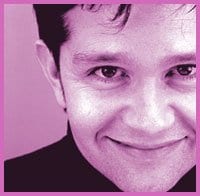Every school had a Peter Paddington. A too-smart, hyperimaginative, hopelessly unathletic chubby boy with a passion for melodrama and a flair for fashion. A boy who’d rather take home-ec than throw a ball. A boy who wanted to grow up and become Brooke Shields. A boy who everyone knew was “that way” long before he did himself.
“I was that boy,” says Brian Francis, author of the new novel Fruit, a funny and touching coming-of-age story about Peter Paddington, a 13-year-old paperboy with talking nipples. “I loved Madonna. I knew all the words to the song ‘Vogue.’ How could I have been in the dark about my sexuality?
“The book isn’t my story, but it is emotionally autobiographical. A lot of Peter’s feelings and anxieties were things that I went through at that age. I call it my gay Judy Blume book – the book I never got to read when I was 13.”
Fruit is narrated by Peter, an irrepressible and overweight outsider, who is more unable than unwilling to butch it up despite the discomfort and worry he causes his eccentric menopausal mother and perpetually bewildered father. And despite his own preternatural good nature, he’s perplexed, tormenting himself about his inability to play sports or make friends with a boy. In fact the only friend he’s got is a foul-mouthed, bad-tempered wannabe beauty queen neighbour. Comfort comes in the form of his Bedtime Movies, nighttime fantasies in which he is glamorous, sexy, popular and often a girl.
“What makes the book funny is that Peter is oblivious. Everything he does screams that he’s gay, but he just doesn’t get it. Even his dreams are about being a girl. I don’t think he actually wants to be female, but it’s the only way he can allow himself to think about being with men.”
With all that repression, something’s got to pop. For Peter, it’s his nipples, which emerge one day as big and as round as cherries. And then his nipples begin to talk to him, threatening to expose his secret fantasies.
“Peter is obsessed with the physical and with trying to have some control over it – whether it’s his weight or his clothes or the hair on his legs. Kids are so fragile at that age and Peter is a kid who is desperately trying to stay in the pack even though he is so clearly different. He’s desperate to survive. I think a lot of gay men can relate to that experience of adolescence. I think a lot of women can, too. That level of self-consciousness and the realization of the confines of their world – you know, this is how girls must be and this is how boys must be- and the expectations placed on them because of that.”
Fruit is Francis’ first novel. It grew out of a short story that was published in 1998 in Xtra’s now defunct literary supplement The Church-Wellesley Review. Writing was squeezed in around his day job, with early encouragement from fellow students in a continuing education writing class at Ryerson University and from the Writers’ Union Of Canada, which gave Francis a writing grant.
“It’s such a long process. I spent two or three years writing it and then another couple of years sending the manuscript out to publishers and agents and having it sit on a lot of desks before ECW Press picked it up. Then the rewriting began. By the time the launch happened it felt like it had been six years since I had started writing.”
Fruit is set in Francis’ hometown of Sarnia, a small south-western Ontario city known more for its malodorous Chemical Valley than its tolerance for difference. The city’s white-bread homogeneity makes Peter’s plight even tougher, as Francis perfectly nails the city’s stifling culture of strip malls, beauty pageants and church-going. “The story could happen anywhere, really. But I chose Sarnia because it’s familiar and also because it’s a place that everyone passes through. No one stays to visit. And no one ever sets a book there. Andre Alexis’ novel Childhood was set in [nearby] Petrolia. When I read it, I thought ‘Why not Sarnia?’
“I think my mom was afraid I was going to be too hard on the city, but I didn’t want to dis the city. It’s quaint. I don’t think it’s a hostile place, but it’s definitely not diverse.”
Francis didn’t come out until he was 21 – after he had left home. “A friend of mine came out in high school and I saw how awful people were to her. And looking back, I wish that I had stood up for her more. I was a preppy, middle-of-the-road kid. I didn’t have the confidence or sense of self to set myself apart. I didn’t have the freak ammunition of being proud of being different.”
After he broke the news to his family, his parents joined the Sarnia chapter of PFLAG (Parents, Families And Friends Of Lesbians And Gays) and soon were avid Pride Day marchers. “What saved my parents was meeting other people like them and realizing that our family was really normal. Then they became aware of the injustices of homophobia and oppression and I think that they felt terrible that they had been oblivious for so long.
“At the same time, things in Sarnia were changing. The city celebrated its first Pride Day a few years ago – so hats off to Sarnia for being a little more tolerant. Maybe things will begin to be a little better for the Peter Paddingtons of the world. I mean who’d have thought that one day I’d be making history, marching past Sarnia’s City Hall with my dad to celebrate being gay?”
* Like many other gay men and lesbians, BookTelevision producer and host Rachel Giese grew up in Sarnia. There was definitely something in the water.
FRUIT.
Brian Francis.
ECW Press.
278 pages. $18.95.


 Why you can trust Xtra
Why you can trust Xtra


